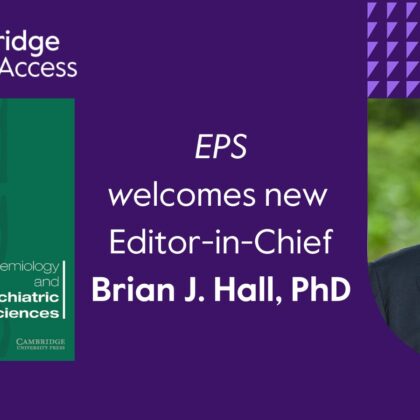Q&A with Corrado Barbui, Editor-in-Chief of Epidemiology and Psychiatric Sciences
Corrado Barbui is the Editor-in-Chief of Epidemiology and Psychiatric Sciences (EPS).
EPS is an international, peer-reviewed journal publishing open access from January 2020. Read the q&a to get to know more about Corrado and the benefits of moving EPS to OA.
- Tell us briefly about yourself and your work in the field.
I hold an MD degree from the University of Milan and a postdoctoral degree in Psychiatry from the University of Verona, Italy. I received training in epidemiology, clinical psychopharmacology and health services research at the Mario Negri Institute for Pharmacological Research, Milan, Italy, and additional training at the Institute of Psychiatry in London, where I joined the Editorial team of the Cochrane Collaboration Depression Anxiety & Neuroses Group. In London I familiarised with the Cochrane approach for conducting systematic reviews and meta-analyses.
Returning to Italy, I conducted research in the field of evidence-based mental health and pharmacoepidemiology under the leadership of Professor Michele Tansella. In 2013 I became Director of the WHO Collaborating Centre for Research and Training in Mental Health and Service Evaluation of the University of Verona, and in 2015 I was appointed Full Professor of Psychiatry. As Director of a WHO Collaborating Centre I’ve been applying the principles of evidence-based mental health to questions that are relevant for low- and middle-income countries. In 2017 I founded “Cochrane Global Mental Health”, a Cochrane network that supports the production, dissemination and implementation of systematic reviews relevant to mental health in low- and middle-income countries.
- What makes EPS a unique and important title in the psychiatric field?
At EPS we feel a strong sense of mission. We aim to change the world of mental health, and we believe that EPS may play an important role in this transformation process. By we, I mean the Senior Editors, who have been extremely important to give a vision and a route to follow, the Associate Editors, who shared with us this vision, and the authors of Editorials, Special Articles and Original Articles, who feel a responsibility of submitting papers of high methodological quality, scientific rigour, and with high innovation and transformation potential.
EPS is not linked to a scientific society or to any other formal entity. There are no economic issues interfering with our work. There are no pressures from any type of stakeholders. This gives us autonomy, freedom, and the possibility of implementing a very well-oriented editorial agenda, always attempting to shed light on important and controversial topics that do not receive enough attention globally. Of course we need help, as we make mistakes and we may not be able to always capture what happens at a global level in the field of mental health, so please readers, authors, referees, colleagues, publisher, and public assist us in showing the way forward.
- What advantages will EPS moving to Open Access bring to authors and readers?
The main advantage is that readers, anywhere in the world, will be able to access any type of published contribution without a subscription. This is a major development, fully in line with current policies on open science and data sharing, and aligned with the journal’s mission of promoting the use of epidemiological methods in mental health.
The main disadvantage, however, is that in place of subscriptions, authors will be asked to pay an article processing charge. However, at EPS this disadvantage will be mitigated by the following factors: 1) the journal offers 100% automatic waivers or a 50% discount for papers where the corresponding author is based in a low resource country, depending on a pre-defined set of economic indicators; 2) authors will have the opportunity to apply for discretionary waivers; 3) authors of invited materials, including editorials and special articles, will not be asked to pay an article processing charge, meaning that the Editors will continue to be free to implement the journal agenda.
- What do you enjoy most about being Editor of EPS?
It’s being part of a community. We share the same passion, dedication and commitment. We are all different, though: different backgrounds, different expertise, different motivation, and different ideas. It’s a big community, which involves scientists, professionals, service users, family members and the global community of those with an interest for mental health.
I enjoy the idea of EPS as a vehicle for describing and understanding reality, and for monitoring and critically evaluating the actions and initiatives aimed at improving mental health in the real world.
Visit the journal homepage at cambridge.org/eps to learn more about EPS and how to submit your latest research.






